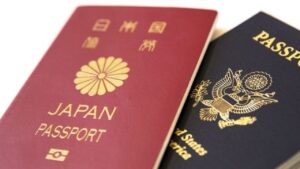
Prime Minister of Ukraine Denys Shmyhal supports the introduction of dual citizenship.
“Dual citizenship is a sign of civilized countries. In many civilized countries it is a common norm […] Dual citizenship should be introduced. It will strengthen us,” Shmyhal told a press conference in Kyiv on Tuesday.
According to him, many ethnic Ukrainians live abroad, and many of them would like to have Ukrainian citizenship.
At the same time, the Prime Minister said that he was categorically against the dual citizenship of the aggressor country.

National online cinema SWEET.TV plans in 2021 to dub and voice over 50 films and 100 trailers in Ukrainian.
As director of SWEET.TV Oleksandr Rezunov said during a conference at the press center of Interfax-Ukraine, popularization of the Ukrainian language and Ukrainian-language content is the platform’s social mission.
“For us, Ukrainianization of cinema has long become the norm. That is why the ‘Hollywood in Ukrainian’ project was created – the main social project of SWEET.TV. Within its framework, we, at our own expense, implement Ukrainian dubbing and voicing of films, cartoons and TV series that have not previously been translated into Ukrainian. To implement this project, SWEET.TV became the first Ukrainian online cinema to enter into direct contracts with Hollywood film studios specifically for the territory of Ukraine, not the CIS,” he said.
According to Rezunov, during the year of the project’s existence, 181 films, cartoons and TV series received the Ukrainian-language audio track. Also, 829 trailers sounded in Ukrainian.
“By the end of 2021, we plan to dub and voice more than 50 films and more than 100 trailers. We also created our own Foundation for the Development of Ukrainian Cinema and Television, where we transfer UAH 10 from each paid connection to SWEET.TV. The collected funds are directed to the implementation of new projects of talented Ukrainian directors,” Rezunov said.
According to him, there are significant opportunities for the growth of OTT services in Ukraine: out of almost 15 million households in the country, only 4-4.5 million use pay TV services.
“Some 10 million Ukrainian households have never paid for television. They are the prospect for the development of the streaming services market, the so-called ‘growth zone’ for OTT companies,” the SWEET.TV director said.
SWEET.TV is a Ukrainian OTT platform with over 260 TV channels, including HD and 4K, as well as products from Disney, Pixar, DreamWorks, etc.
The platform has direct contracts with Disney, Paramount, Universal, Sony and other international content producers for dubbing media products specifically for the territory of Ukraine, and not for the CIS. The service creates Ukrainian-language dubbing for cult Hollywood films in the “Hollywood in Ukrainian” project.

National online cinema SWEET.TV stands for the introduction of liability for the population for the use of pirated content.
During a press conference at the press center of Interfax-Ukraine, SWEET.TV director Oleksandr Rezunov said that the operation of pirate services in Ukraine is still very active, which is primarily due to high demand from users.
“This issue requires a tough reaction from the state. And the introduction of liability for consumers of pirated content. Also, due to pirated sites, Ukrainian content producers lose millions of hryvnia. This leads to insufficient funding for future projects and reduces the quality of the content produced,” he said.
According to Rezunov, the issue of developing a mechanism for introducing such a penalty is on the side of the legislative branch.
“The size of the fine I would introduce is small, purely symbolic – about UAH 100. Why is this needed? Not to take money from consumers. The main problem of the market is that people do not always understand or forget that they are watching illegal content, and the industry loses from this, the state loses taxes, copyright holders lose royalties and cannot produce high-quality content. A purely symbolic fine would lead to the fact that a person remembered about it,” the SWEET.TV director said.
To combat piracy, SWEET.TV became a member of the Supervisory Board of the Media & Communication Committee of the American Chamber of Commerce in Ukraine. In addition, the company is a member of the Clear Sky anti-piracy initiative.
The SWEET.TV director called the high activity of international broadcasting platforms another problem of the Ukrainian pay TV market.
“In Ukraine, it is necessary to introduce equal conditions for doing business. In particular, the requirements regarding language quotas are practically not applied to foreign media platforms. There is no practical implementation of tax norms – now the adopted regulatory legal acts introducing VAT payment by nonresidents who provide online media services simply do not work,” Rezunov said.
He also stressed that Russian streaming services available on the territory of Ukraine, in fact, violate Ukrainian legislation in terms of the unhindered broadcasting of content from Russian media that have come under sanctions.
SWEET.TV is a Ukrainian OTT platform with over 260 TV channels, including HD and 4K, as well as products from Disney, Pixar, DreamWorks, etc.
The platform has direct contracts with Disney, Paramount, Universal, Sony and other international content producers for dubbing media products specifically for the territory of Ukraine, and not for the CIS. The service creates Ukrainian-language dubbing for cult Hollywood films in the “Hollywood in Ukrainian” project.

Adoption of the law on the timber market, allowing the export of unprocessed timber and sawn timber from Ukraine, is forecasted until the end of this year, its entry into force does not pose significant threats to the country’s forest resources and related businesses, Head of the State Forest Resources Agency of Ukraine Yuriy Bolokhovets has said in an exclusive interview with Interfax-Ukraine.
“I predict that the law on the timber market will be adopted by the end of the year. I do not see any major threats either from the point of view of preserving the forest fund, or from the point of view of protecting and supporting Ukrainian business. We are already working at European prices, there are precedents for the import of raw materials from the EU countries. Therefore, we do not expect rush demand from exporters or foreign players,” the head of the agency said.
According to him, the Ukrainian timber market was interesting for foreign players, while significant volumes of cheap illegally logged timber were present there, but those times have already passed.
Bolokhovets also said that due to the possible lifting of the moratorium on the export of unprocessed timber, Ukrainian processors should think about developing their business and strengthening competitiveness.
“Today, the majority is engaged in trivial sawing of timber. It is necessary to deepen processing, increase the added value of products,” the head of the State Forest Resources Agency said.

Ukrainian banks issued 5,626 mortgage loans worth over UAH 4.4 billion in January-July 2021, which is 2.3 times higher than the indicator for seven months ending July 2020 in the number of such loans and three times in volume, the National Bank Of Ukraine (NBU) said on Friday following the results of a monthly survey of banks.
According to the NBU, 974 mortgage loans for UAH 773.2 million were issued in July, compared with 955 loans for UAH 774.5 million a month earlier.
Some 21 banks reported information on the issuance of mortgages in July, and this is the largest number of market participants since the beginning of the survey in 2018, the regulator said.
The NBU said that the mortgage lending market remains concentrated: the five most active banks have concluded 90% of new deals. Loans for the purchase of housing in the secondary real estate market remain the main driver of the market: in July, their share exceeded 90% of all mortgage loans provided both in terms of the number of contracts and in terms of monetary volume, the regulator said.
The survey results indicate that the average size of a loan for the purchase of housing in July decreased to UAH 793,800 from UAH 811,000 in June, including the average size of a new mortgage loan for the purchase of primary real estate dropped to UAH 760,500 from UAH 851,000, and secondary – to UAH 797,000 from UAH 807,250.
According to the NBU, in July, the average effective rate of a mortgage loan in the secondary market rose to 13.35% compared to 13.32% in June, while in the primary market it decreased to 16.82% from 17.28%.
National bank of Ukraine’s official rates as of 14/09/21

Source: National Bank of Ukraine